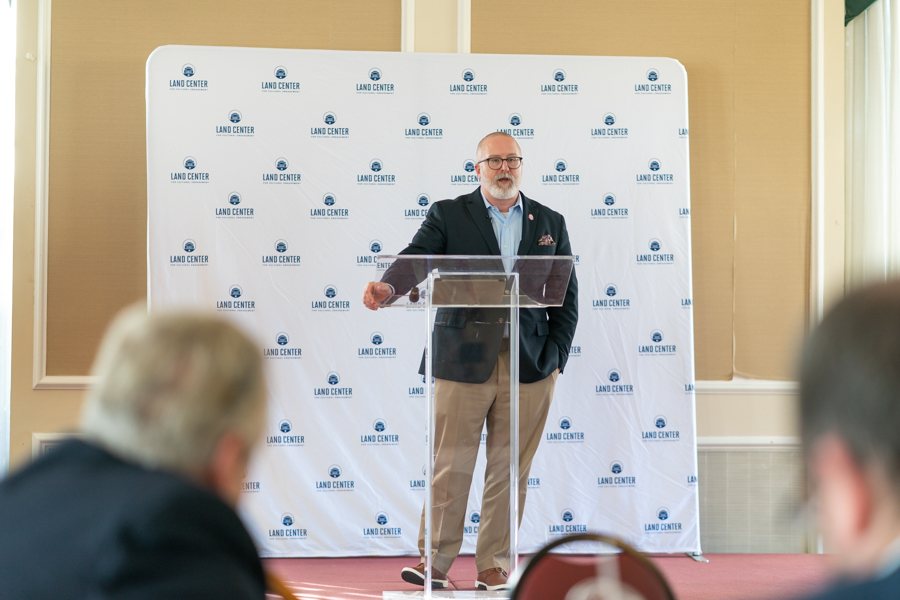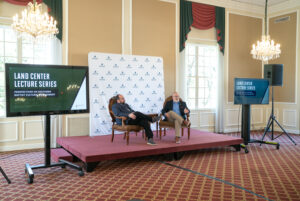Land Center lecture series focuses on Southern Baptist engagement of culture

Looking at politics, science, and education from a “perspective on Southern Baptist cultural engagement,” the Land Center for Cultural Engagement Lecture Series event held Oct. 25-26 at Southwestern Baptist Theological Seminary featured three one-hour lectures from Nathan Finn, Baptist historian and provost and dean of the university faculty at North Greenville University.
Finn, who is also a senior fellow of the Land Center, was named the featured speaker after the original speaker, ethicist C. Ben Mitchell, also a senior fellow of the Land Center, had to cancel due to a severe back injury. Richard D. Land, president emeritus of the Ethics and Religious Liberty Commission of the Southern Baptist Convention (ERLC) and namesake of the Land Center, was in attendance through all three sessions and the final hour of a question-and-answer session, which was moderated by Daniel M. Darling, director of the Land Center and assistant professor of faith and culture at Texas Baptist College.
Finn was introduced by the interim president of Southwestern Seminary, David S. Dockery, who is also a Land Center senior fellow. Dockery described Finn as an “exemplary Baptist historian” and a “great thinker” and also recognized and introduced Land as “a symbol and great voice for Southern Baptists in the public square.”
Dockery stated that he and Finn are co-editors of The Theology for the People of God, a 16-volume series that Dockery described as being “projected to be the largest theological contribution that Baptists have made in the past four hundred years.” Dockery further mentioned that Finn is scheduled to write a future volume on sanctification for the series, the first volume of which was published in 2020 and will continue through 2030.
Introducing the lectures, Finn said, “the theme is Baptists and cultural engagement, Southern Baptists in particular,” with the first session on politics being titled “The Separation of Church and State: A Southern Baptist Perspective.”
“If you know anything about Baptists, if you know anything about politics, you know Baptists talk a lot about religious liberty and separation of church and state,” Finn said, adding that Baptists have “always advocated soul freedom or liberty of conscience in matters of religion.” Finn traced the history of Baptists and religious liberty beginning with 17th century English minister Thomas Helwys, founder of “the first Baptist church on English soil,” in 1612 located in what is now East London, England.
Finn continued through the years, noting long-time pastor of First Baptist Church of Dallas, Texas, George W. Truett, delivered “his most note-worthy sermon, ‘Baptists and Religious Liberty’,” on the steps of the U.S. Capitol in 1920.
Finn mentioned Land’s service as president of what would eventually be called the Ethics and Religious Liberty Commission from 1988 to 2013 and activities beyond the Southern Baptist denomination. Finn also noted Baptists as recently as Bart Barber, the current Southern Baptist Convention president, speaking on religious liberty.
Finn concluded session one by saying, “we should continue to champion religious freedom for all people and the separation of church and state, to the glory of God, for the health of the church, for the advance of the Gospel, and for the sake of human flourishing.”
At the end of session one, Land addressed the gathering of students, professors, and guests, saying, “I am encouraged by this crowd,” and that Finn’s “very accurate summary” on a Baptist perspective of politics “confirms why I’m so excited about the Land Center.”
“I believe it’s never been more important for us to understand who we are, why we are who we are, and to help the American people to understand our vision than it is today. We live in a crisis moment,” Land said.
Finn titled the second session on science as “Southern Baptists and Darwinism: The Evolution of a Perennial Controversy.” Finn traced early negative views by Southern Baptists, but also some varied opinions by Baptists, on evolution and Darwinism over the last 150 years.
“Evolution has always been a smoldering issue, if you will, that from time to time flares up into a brush fire and occasionally a forest fire, some might even say a dumpster fire. How best to put the fire out remains to a matter of debate among committed Southern Baptists,” Finn said.
Finn began with the Toy Controversy, so named for Crawford Toy, an Old Testament professor at Southern Baptist Theological Seminary in Louisville, Kentucky, who resigned in 1879 after espousing favorable views of evolution. Finn also detailed J. Frank Norris, pastor of First Baptist Church of Fort Worth, and his fierce opposition to evolution.
Concluding session two, Finn summarized, “I’m hopeful that Southern Baptist life in general will be evidenced by a hospitable orthodoxy on this issue that allows a place at the table for any scholar who claims Jesus is Lord, adheres to a high view of Scripture, rejects naturalistic explanations for the origins of creation, and unhesitatingly affirms belief in God the Father Almighty, the maker of heaven and earth.”
In the third session on education, Finn focused on Dockery’s contribution to higher education. “I get to talk about a dear friend and a key mentor and your interim president, David Dockery, who has deeply shaped the way I think about these things,” he said.
His education lecture was titled, “Evangelical by Conviction, Baptist by Tradition: David Dockery’s Vision for Higher Education,” and began with Dockery’s being awarded the John R. Dellenback Global Leadership Award from the Council for Christian Colleges and Universities in 2018. Dockery served as president of two prominent Christian universities, Union University from 1995 to 2014, and Trinity International University from 2014 to 2019.
Dockery’s reputable and respected history was traced by Finn, especially highlighting Dockery’s efforts to bridge together evangelicalism and Southern Baptists and also his reconciliatory tone and reflective manner he conveyed in discussing inerrancy.
“James Leo Garrett suggests that Dockery’s writings on the doctrine of Scripture, including his expertise in hermeneutics, represented the most reflective aspects of the SBC inerrancy controversy,” Finn said. “But unlike some conservative SBC theologians, Dockery was more irenic in his demeanor.”
Finn highlighted the most recent ties between Dockery, a 1981 Master of Divinity graduate of Southwestern Seminary, and the Fort Worth institution. “In 2019, Dockery accepted a role at Southwestern Seminary as professor of theology, theologian-in-residence, and special consultant to the president,” and also became editor of the Southwestern Journal of Theology, served as interim provost from December 2020 to February of this year, and became the founding director of the Dockery Center for Global Evangelical Theology. “Of course, he is now the interim president of this wonderful seminary,” Finn added.
Finn ended the session with a “more personal word” about Dockery’s influence on Finn as a student in his early twenties. “As a collegian and a wannabe Baptist historian I found myself increasingly thankful for the works of David Dockery,” Finn said. “I was surprised to learn Dockery was not a historian by profession. He seemed to understand recent Southern Baptist history and the history of Baptist thought about as well as most of the professional historians I was reading – most of them were moderates. But he also seemed – nice. What stood out most about Dockery was that he was never pugnacious. He approached some of the most controversial topics in Baptist history and theology as if neighbor love really matters not just winning the debate.”
“By the time I began seminary I knew that there were different sorts of conservatives among Southern Baptists. I wanted to be a David Dockery conservative who could use my scholarly gifts to interpret Southern Baptist history and theology but without being unnecessarily provocative or even polemical when it wasn’t appropriate,” Finn said in closing comments for the final lecture session.
Darling, commenting after the lectures, said, “It was really encouraging to see students and faculty attend the annual Land Center lectures with Dr. Nathan Finn. Dr. Finn’s addresses touching on the history and future of Southern Baptist engagement in the culture were perfect in helping the Land Center articulate a distinctly Southern Baptist way of living in the world.”
Darling added, “Lectures like this are an essential part of the formation of future pastors, missionaries, business leaders, public officials, teachers or wherever students are called to serve Christ’s church.”
The entire lecture series can be viewed here.




